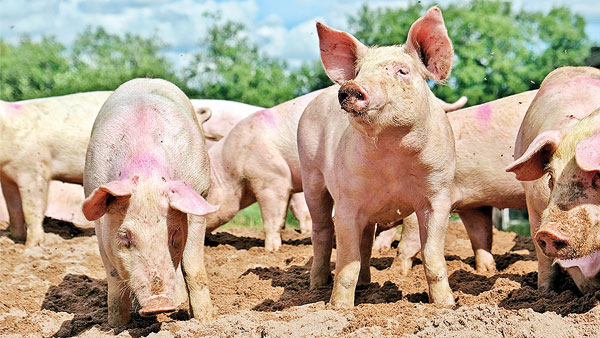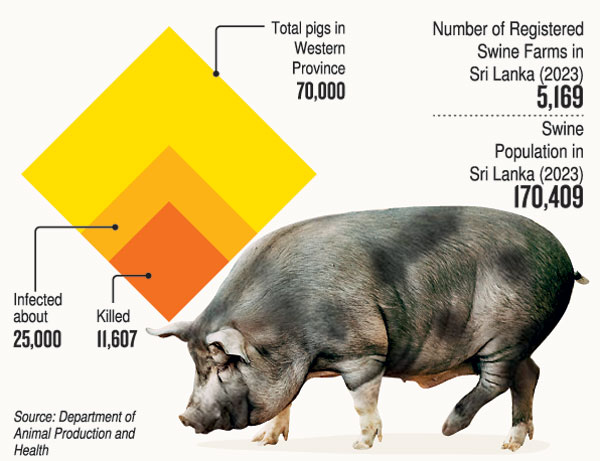News
Devastating pig disease triggers tighter vigilance advice
View(s):By Nathara Abeywickrema
State veterinarians are advising pig farms to be vigilant about a highly contagious viral disease ahead of the festive season.
Infections of African Swine Fever (ASF) and Porcine Reproductive and Respiratory Syndrome (PRRS) have been recorded in some pig farms.
ASF is particularly notorious for causing high mortality rates. However, while these diseases present significant challenges, veterinary experts insist that with proper measures, the risks to pigs and humans can be effectively managed.

ASF symptoms in pigs include high fever, weakness, skin lesions, and sudden death in severe cases
ASF is a severe viral disease affecting domestic and wild pigs, often leading to high mortality within herds. While not dangerous to humans, ASF spreads rapidly among pigs, mainly through direct contact, contaminated equipment, and feed. Symptoms in pigs include high fever, weakness, skin lesions, and sudden death in severe cases.
With no cure or World Organisation for Animal Health-approved vaccine available for ASF, prevention remains the most effective measure, advised Dr. Sisira Piyasiri, president of the State Veterinary Surgeons’ Association (SVSA).
PRRS, meanwhile, affects the respiratory and reproductive systems of pigs, causing respiratory issues in young pigs and reproductive failure in sows. PRRS is less deadly than ASF but still badly impacts farm productivity. Symptoms include difficulty in breathing, poor growth in piglets, and reproductive issues in adult pigs. Unlike ASF, PRRS can be managed through vaccination, though its highly contagious nature requires consistent prevention efforts on farms.
Swill-feeding: feeding pigs or poultry food waste that contains meat or has come into contact with meat is a major contributor to the spread of diseases like ASF and PRRS. To mitigate this, farm owners are advised to boil food waste before feeding it to animals. However, compliance is low.

Post-mortem inspections by certified veterinarians are essential to determine if slaughtered swine are fit for human consumption, yet these inspections are often conducted by PHIs, which is less effective. Clinical evaluations by veterinary surgeons can detect any existing conditions early, enabling timely diagnosis and response, noted Dr. Piyasiri.
Pig farmers are also urged to avoid selling animals that have died from ASF or PRRS, as this practice helps restore public trust in the industry and supports disease control efforts. Furthermore, veterinary experts call on authorities to take proactive steps to protect the pig farming sector, which is already struggling due to the economic crisis and these ongoing health challenges.
Veterinary experts emphasise the importance of stringent biosecurity measures and close communication with local veterinary offices to prevent and manage the spread of ASF and PRRS. By maintaining high standards of hygiene on farms, farm owners and workers can better protect against these diseases. Experts advise disinfecting all equipment, feed, and clothing thoroughly before entering pig enclosures. Establishing secure perimeters to prevent wildlife from accessing piggeries is also highly recommended, as it minimises the risk of disease transmission.
Veterinary experts note that several factors can impact the adoption of biosecurity measures, including limited knowledge and awareness, financial constraints, and socio-cultural influences.
Prompt reporting and monitoring are also crucial. Farm owners should immediately alert veterinary authorities to any signs of ASF or PRRS, Dr. Piyasiri said. Early detection can help contain the spread to other farms or areas.
Routine veterinary health checks play a significant role in early detection, particularly in areas where infections have already been reported. Screenings allow veterinarians to stay informed and offer farm workers guidance on safety protocols tailored to their specific needs, he said.
Worker safety is essential, even though ASF poses no risk to human health. Understanding disease transmission is still important for those in the industry. Protective clothing, limited direct contact with sick animals, and thorough handwashing are recommended.
Farm managers are encouraged to provide training that reinforce proper biosecurity practices, ensuring that all workers are well-prepared to prevent the spread of these diseases. Through these collective efforts, the pig farming industry can safeguard animal health and farm productivity, noted Dr. Piyasiri.
The Department of Animal Production and Health (DAPH), through a Gazette extraordinary, has declared measures following reports of ASF and PRRS across every district secretary division.
The Gazette outlines restrictions to contain and prevent the spread of ASF and PRRS, effective for three months unless otherwise extended. Prohibited activities include the movement and sale of pigs and pork products, slaughter and artificial breeding of susceptible animals, live animal markets, and the disposal of infected carcasses in ways that could spread the disease.
Following the slaughter of pigs, the meat is inspected to ensure it is safe and suitable for human consumption, PHI Chamil Muthukuda, secretary of PHI Union said.
Public Health Inspectors (PHIs) play a key role in overseeing these inspections, covering activities in slaughterhouses and cold storage facilities. With the recent prohibition on the sale of pork, PHIs are working to prevent any illegal sales and unauthorised slaughtering.
Officials are emphasising the importance of early reporting and are making routine visits to at-risk areas to monitor signs of infection. As the situation develops, PHI Muthukuda and teams are working closely with all stakeholders to contain the disease.
K.K. Sarath, director of the Western Province Animal Production and Health Department, emphasised the importance of identifying infected animals on pig farms and isolating those unaffected.
The DAPH has requested pig farm owners across the island to register at their nearest veterinary office so that farms can be evaluated, Mr. Sarath said. He confirmed that cases of ASF and PRRS have been reported in the Western, Uva, Northern, and North Western Provinces. However, he reassured that the impact on the upcoming festive season can be minimised if proper control measures are taken, noting that many animals have died.
Officials also advised farm owners on the proper disposal of pigs that have died from ASF or PRRS. Incinerating carcasses is strongly recommended, and if burial is necessary, protective greasing layers should be used.
He advised farmers against discarding carcasses in waterways or forested areas, because it could spread the disease among wild pig populations.
Additionally, it is crucial for farm owners to prevent pig waste from contaminating the surrounding environment to curb the spread of infection, Mr. Sarath said.
The best way to say that you found the home of your dreams is by finding it on Hitad.lk. We have listings for apartments for sale or rent in Sri Lanka, no matter what locale you're looking for! Whether you live in Colombo, Galle, Kandy, Matara, Jaffna and more - we've got them all!

